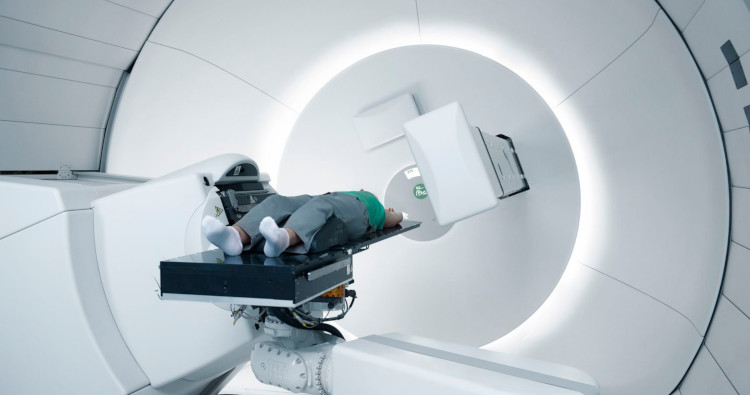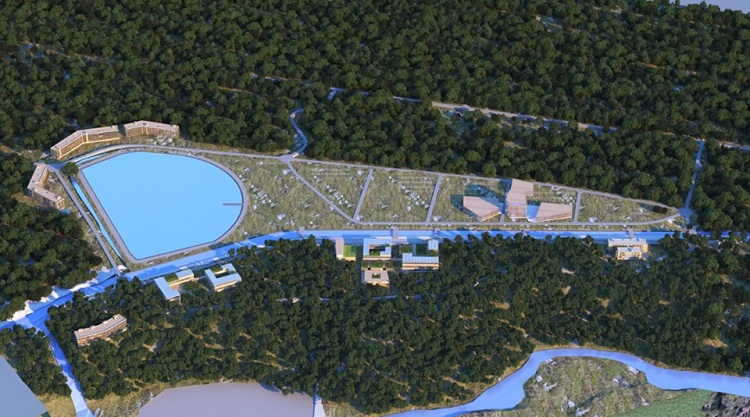Georgia to become regional hub for advanced hadron therapy for cancer

The city of Kutaisi will be the location for hadron therapy for cancer, an advanced method of treatment available only in select IBA concern facilities around the world. Photo: IBA.
Georgia will boast the first and only hadron therapy centre for science and medical treatment in the South Caucasus, with the facility for advanced cancer treatment set to open alongside the launch of the Kutaisi International University in the country's west.
Involving a hadron accelerator and infrastructure for both scientific research and medical treatment, the centre will be launched in the city of Kutaisi, 230 kilometres west of capital Tbilisi, where the major university will open next year.
It will be the "leading provider of scientific and educational services in the entire Caucasus region", a release from Cartu foundation - which finances the university and centre project - said.
Also dubbed the "biggest and most large-scale construction project in Georgia" as part of the university project, the hadron therapy centre will provide an advanced type of cancer treatment to patients.

Representatives of European universities and companies, including IBA concern executive vice president Serge Lamisse (far right) joined Georgian officials and Kutaisi university rector for the reveal event in Tbilisi. Photo: Nino Alavidze/agenda.ge.
The reveal of the university and hadron centre came in Tbilisi last week with a panel involving representatives of the international IBA concern for hadron therapy technology, Jülich Research Centre in Germany and the Technical University of Munich, partners of the Georgian project.
The medical designation of the centre will serve patients needing radiotherapy in Georgia, with IBA Executive Vice President Serge Lamisse telling the audience for the panel around 20 percent of approximately 10,000 patients diagnosed with the disease in the country would benefit from hadron therapy.
This type of therapy differs from conventional treatment methods by enabling professionals to target cancer cells while limiting radiation exposure to healthy parts of the system. It also permits treatment of children affected by the disease, unlike other methods that introduce secondary cancer while treating the main source in kids.
Today there are only 150 centres around the world that are able to deliver this very precise and very innovative treatment and Georgia should be very proud to soon add access to this therapy" - Serge Lamisse, Executive Vice President, IBA
Lamisse noted there were no comparative centres for treatment in a radius of about 2,500 kilometres around Georgia, with the nearest facilities in Czech Republic and Russia.

The hadron therapy centre will be part of the Kutaisi International University, a major state project which will receive its first entrants in 2020. Photo: Kutaisi International University.
The educational segment of the hadron centre for students in Kutaisi will involve training of professionals like radiotherapists, dosimetrists, technicians and physicists, Lamisse told the audience in Tbilisi, with training to be provided at centres in the United States and Europe.
A "research accelerator" will also be opened in the city to "help advance knowledge in hadron therapy", with directions like improving imaging quality in scans to identify cancer and delivery of treatment doses.
The 1€ billion project for the Kutaisi International University, including the hadron therapy infrastructure, was first announced in 2016, with first university entrants to be accepted in September 2020.
Students in mathematics, computer science and management will be able to join the educational institution - the first state university opened since the restoration of Georgia's independence in 1991.
It is part of a push to transform Kutaisi, capital of the Imereti province and a hub in western Georgia, into a "university city". It will involve Georgian and foreign academic staff, with qualifications for selecting them to be outlined based on criteria of the Technical University of Munich.
The hadron therapy infrastructure comes as a result of the work by the Cartu foundation over the last several years in Kutaisi and Tbililisi. The former city will see the launch of a cyclotron accelerator, while the project in the capital involves building a synchrotron accelerator along with launching a "cluster" of natural sciences institutes.
 Tweet
Tweet  Share
Share